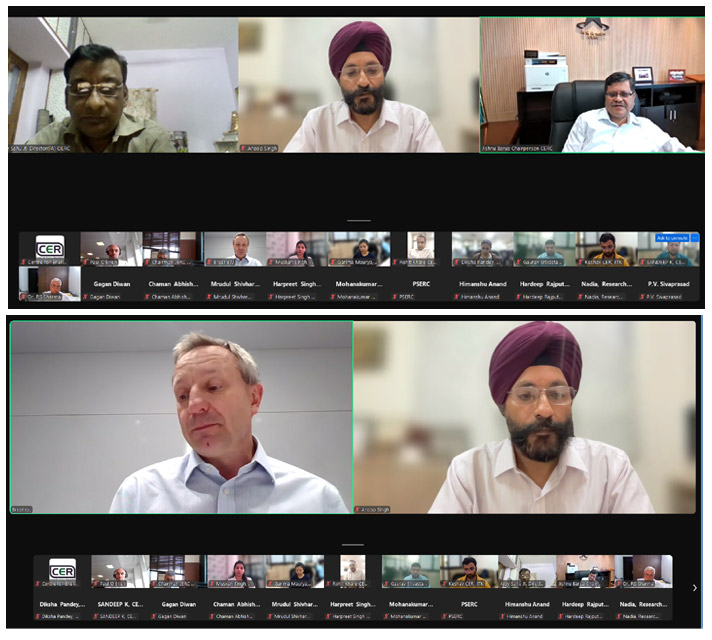-
The Regulatory Conclave on "Regulatory Governance in the Indian Power Sector: Reporting and Accounting Framework for ERCs".
-
The event brought together key stakeholders from CERC, SERCs, national and international experts.
-
Discussions highlighted the need for robust accountability mechanisms and consistent reporting practices.
Kanpur, 22 July, 2024: The Centre for Energy Regulation (CER) at the Indian Institute of Technology Kanpur (IITK) recently hosted a virtual Regulatory Conclave titled "Regulatory Governance in the Indian Power Sector: Reporting and Accounting Framework for ERCs". The event brought together key stakeholders from the Central Electricity Regulatory Commission (CERC), State Electricity Regulatory Commissions (SERCs), and leading national and international experts.

The discussions at the Conclave focused on the importance of robust accountability mechanisms and consistent reporting practices by Electricity Regulatory Commissions (ERCs). Experts emphasised the need to integrate global standards to enhance efficiency and effectiveness within regulatory governance framework in the Indian power sector.
Professor Anoop Singh of the Department of Management Sciences, IIT Kanpur, discussed that the reporting framework of ERCs includes the publication of Annual Reports and Annual Account Statements as mandated by the EA 2003 and under a framework outlined by rules issued by the respective government. The CER conducted an in-depth analysis of the reporting frameworks used by ERCs, assessing their scope, level of detail, and accountability to key stakeholders and timely publication of reports and statements to ensure that stakeholders have access to the latest information promptly.
The comparative analysis was conducted on the reporting and accounting framework of ERCs and other regulatory bodies in India, including TRAI, SEBI, IRDAI and PNGRB and a detailed comparison with international counterparts, such as Ofgem in the UK, the Australian Energy Regulator (AER), the Australian Energy Market Commission (AEMC), the Federal Energy Regulatory Commission (FERC) in the USA and the Commission de Régulation de l'Énergie (CRE) in France. This analysis drew upon both national and international best practices to provide a comprehensive evaluation.
One of the significant findings was the need for consistency and standardisation in reporting standards across ERCs. The conclave emphasised the importance of adopting the best practices to improve transparency, efficiency, and stakeholder engagement within the Indian power sector. The collaborative efforts of stakeholders aim to pave the way for a more resilient and responsive regulatory framework ensuring higher accountability to stakeholders.
Centre for Energy Regulation (CER), IIT Kanpur at DOMS was set up through seed funding by the UK's Foreign, Commonwealth & Development Office (FCDO). CER leads Regulatory Research, Capacity Building, and Knowledge Dissemination activities, fostering interactions among regulatory bodies, utilities, and other stakeholders in the Indian Power Sector to drive sustainable power sector development. "Power Sector Reforms (PSR) Programme - Phase II" is supported by the FCDO under the INDIA-UK Partnering for Accelerated Climate Transitions. The program supports structural reforms, integrates renewable energy, and builds regulatory capacity through technical expertise and institutional strengthening. The UK Government has approved further support, through FCDO, under the Power Sector Reforms (PSR) II Programme, focusing on regulatory research, knowledge base, and capacity building involving key sector stakeholders.
About IIT Kanpur:
Indian Institute of Technology Kanpur was established in 1959 and declared to be an Institute of National Importance by the Government of India through an Act of Parliament. IIT Kanpur is best known for the highest standard of its education in science and engineering and seminal R&D contributions over the years. The institute has a sprawling lush green campus spread over 1050 acres with large pool of academic and research resources spanning across 19 departments, 25 centers and 3 interdisciplinary programs in engineering, science, design, humanities, and management disciplines with more than 580 full-time faculty members and approximately 9000 students.
For more information, visit www.iitk.ac.in.











